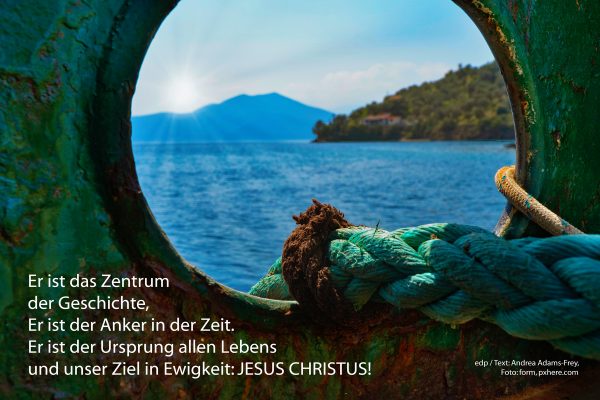
[nx_spacer size=”5″]Drei Gedanken haben mich beim Lesen des letzten Kapitels im Buch Daniel (12) angesprochen:
(1) Menschen, die sich Gott anvertrauen, können in schwierigen Zeiten mit dem besten Schutz rechnen, den es geben kann: Michael (hebräisch: Wer ist wie Gott?, einer der vielen Namen für Jesus Christus im Alten Testament) tritt für sie ein, „wie er es schon immer getan hat“. Darum haben wir nichts zu befürchten.
(2) Wer sich für Jesus Christus entscheidet, dessen Name wird in Gottes Supercomputer im Verzeichnis der Bürger seiner Neuen Welt gespeichert (in der Bibel „Buch des Lebens“ genannt). Wie hoch der Preis für diese Einbürgerung ist? Unbezahlbar: der Tod von Jesus am Kreuz! Jeder Versuch, etwas davon „abzubezahlen“, wäre eine Beleidigung Gottes!
(3) Daniel ist nicht bereits im Himmel (welche Freude hätte er dort beim Beobachten all der Dinge, die sich auf der Erde abspielen!), er schmort auch nirgendwo in einer Hölle, die es nach der Bibel nicht gibt. Er ruht einfach im Grab bis zur Auferstehung „am Ende der Tage“. Das ist gut so. Nach einem gefüllten, für manche leidvollen Leben, ruhen zu dürfen bis Jesus Christus wiederkommt, ist eine gute Sache. Hoffentlich kommt Er bald wieder!
Alle zwölf Beiträge auf einen Blick
![]()
He may rest (Daniel 12)
Three thoughts came to my mind while reading the last chapter in the book of Daniel (12):
(1) People who have entrusted their lives to God can count on the best protection there is in difficult times: Michael (Hebrew: Who is like God?, one of the many names for Jesus Christ in the Old Testament) intercedes for them “as he has always done”. Therefore we have nothing to fear.
(2) Whoever decides for Jesus Christ, his name will be stored in God’s supercomputer in the directory of citizens of his New World (called “Book of Life” in the Bible). What is the price for this naturalization? Priceless: the death of Jesus on the cross! Any attempt to “pay off” any of it would be an insult to God!
(3) Daniel is not already in heaven (what joy he would have there, watching all the things that happen on earth!), nor is he in a hell that does not exist according to the Bible. He simply rests in the grave until the resurrection “at the end of days”. That is good. After a filled life, which for some is full of suffering, to be allowed to rest until Jesus Christ comes back is a good thing. Hopefully He will come back soon! (Foto)
All twelve contributions at a look
![]()
También él puede descansar (Daniel 12)
Tres pensamientos de mi lectura del último capítulo del libro de Daniel (12):
(1) Quienes confian en Dios pueden contar con la mejor protección que existe en tiempos difíciles: Miguel (hebreo: ¿Quién es como Dios?, uno de los muchos nombres de Jesucristo en el Antiguo Testamento), intercede por ellos “como siempre lo ha hecho”. Por lo tanto, no tenemos nada que temer.
(2) Quienquiera que entregue su vida a Jesucristo, su nombre está registrado por Dios en el directorio de los ciudadanos de su Nuevo Mundo (llamado el “Libro de la Vida” en la Biblia). ¿Cuál es el precio para ser inscrito? Es impagable: ¡la muerte de Jesús en la cruz! Cualquier intento de “pagar algo a cuenta” sería un insulto a Dios.
(3) Daniel no está ya en el cielo (¡cómo podría disfrutarlos viendo todas las cosas que pasan en la tierra!), ni tampoco está en un infierno que según la Biblia no existe. Simplemente descansa en la tumba hasta la resurrección “al final de los tiempos”. Eso está muy bien. Después de una vida intensa, que para algunos está llena de sufrimiento, es bueno que se nos permita descansar hasta que Jesucristo regrese. ¡Ojalá vuelva pronto! (Foto)






